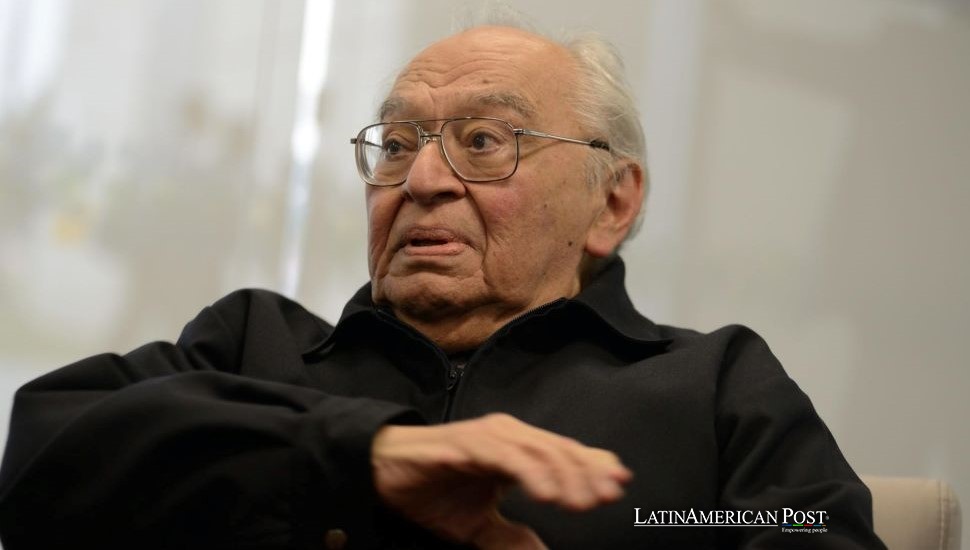Gustavo Gutierrez, Liberation Theology, and Its Connection to Armed Struggles in Latin America

The death of Gustavo Gutierrez, a key figure in liberation theology, marks the end of an era that inspired movements across Latin America, including connections to armed groups like Colombia’s ELN. His teachings linked faith with social justice and resistance.
Liberation Theology and Its Revolutionary Influence
Peruvian priest Gustavo Gutierrez, regarded as the father of Latin American liberation theology, died last week at 96. Gutierrez profoundly shaped Latin America’s social, religious, and political landscape. His 1971 work A Theology of Liberation presented a radical interpretation of Christian salvation, arguing that it wasn’t just about spiritual freedom and liberating people from material and political oppression. His ideas deeply influenced movements across Latin America, particularly in countries suffering from inequality, dictatorship, and violence.
In Colombia, Gutierrez’s theology found resonance with revolutionary groups like the National Liberation Army (ELN), whose roots intertwined with the Catholic Church’s calls for social justice. Liberation theology argued that the church should actively support the poor and oppressed, leading to an alignment between faith-based activism and political struggles. The ELN, with its Marxist ideology and connection to rural disenfranchised communities, viewed Gutierrez’s teachings as justification for their armed resistance against the state.
Camilo Torres Restrepo was one of the most prominent figures who embodied the fusion of liberation theology and armed struggle. A Colombian Catholic priest and co-founder of the National University of Colombia’s sociology faculty, Torres became a key advocate for liberation theology in the 1960s. His beliefs combined revolutionary socialism and Catholicism, positioning him as a spiritual leader and a guerrilla fighter within the ELN. His famous quote, “If Jesus were alive today, He would be a guerrilla,” encapsulated the radical vision that linked Christian doctrine with the need for violent revolution to achieve social justice.
Camilo Torres: The Martyrdom of a Catholic Revolutionary
Camilo Torres is a central figure in the ELN’s early history, representing the link between Gutierrez’s liberation theology and armed struggle. Born in Bogotá in 1929, Torres was deeply influenced by the growing inequalities he saw in Colombia and Marxist ideology. His religious and political journey began within the Catholic Church, where he was ordained as a priest in 1954. However, his growing frustration with the church’s reluctance to support the poor pushed him toward a more radical path.
By the early 1960s, Torres was advocating for social change through peaceful means and engaging with leftist political movements. His involvement with student groups and his work as a sociology professor earned him widespread support but attracted opposition from the government and the church. Under increasing pressure to abandon his political activism, Torres ultimately left his academic post and joined the ELN in 1965.
In the ELN, Torres provided spiritual guidance and ideological inspiration to the guerrilla fighters. He believed the church’s mission was to support revolutionary efforts to overthrow corrupt regimes and create a more just society. His role within the ELN was significant but short-lived; he was killed in his first combat engagement in 1966 during an ambush by the Colombian military. The ELN later celebrated Torres as a martyr, and his memory continues to inspire revolutionary movements across Latin America.
Torres’s life and death illustrate the powerful intersection of faith, ideology, and violence that shaped much of Latin America’s political landscape in the 20th century. His alignment with liberation theology and Marxism reflected a broader regional trend where religious figures were often involved in political struggles, both peaceful and violent.
The ELN’s Embrace of Liberation Theology
The ELN’s roots in liberation theology testify to the enduring influence of figures like Gutierrez and Torres. The group emerged in the 1960s as a Marxist guerrilla organization with a mission to represent the poor and marginalized in Colombia. While the ELN was primarily a political and military organization, its leaders were heavily influenced by the Catholic Church’s calls for social justice, particularly in rural areas where inequality and poverty were rampant.
Torres’s involvement with the ELN brought the ideals of liberation theology directly into the organization’s ideology. His role as a priest and a guerrilla leader provided a moral and theological foundation for the ELN’s armed resistance. The group saw itself not just as a political force but as a movement fighting for the liberation of the poor, echoing Gutierrez’s teachings that Christian salvation must include freedom from material oppression.
Though Gutierrez himself never endorsed violence, his theology helped shape the ideological framework of groups like the ELN, which saw armed struggle as a legitimate means to achieve justice. The ELN’s alignment with liberation theology made it distinct from other guerrilla groups in Colombia, as it positioned itself as both a revolutionary force and a defender of the marginalized, often invoking religious language to justify its actions.
Over the decades, the ELN’s connection to liberation theology has waned, but the group continues to draw on these ideological roots. Priests and religious figures sympathetic to liberation theology have supported communities affected by Colombia’s internal conflict, even as they advocate for peace and justice through non-violent means.
The Legacy of Liberation Theology in Modern Latin America
Gutierrez’s influence extends far beyond the revolutionary movements of the 20th century. His ideas of social justice and the church’s role in advocating for the poor continue to resonate across Latin America, even as the region’s political landscape has evolved. The relationship between religion and social activism remains strong, with liberation theology still inspiring grassroots movements that challenge inequality and human rights abuses.
In Colombia, the legacy of liberation theology and figures like Camilo Torres continue to shape the country’s political and social fabric. While the ELN remains an active guerrilla group, peace talks and negotiations have often been influenced by religious leaders who draw on liberation theology’s emphasis on dialogue and reconciliation. The Catholic Church, which once condemned liberation theology for its perceived Marxist leanings, has, under Pope Francis, embraced many of its principles, particularly in its focus on the poor and marginalized.
As Latin America faces new challenges, from economic inequality to environmental crises, liberation theology remains a powerful tool for advocating for systemic change. Gutierrez’s death at 96 marks the end of an era, but his ideas continue to inspire a new generation of activists, scholars, and religious leaders. His work serves as a reminder that faith and social justice are deeply intertwined and that true liberation requires spiritual and material freedom.
Also read: Amnesty International’s Empty Words on Latin American Fires
Gutierrez’s theology and the revolutionary actions it inspired in figures like Camilo Torres leave a lasting legacy in Latin America’s ongoing struggle for justice. While the relationship between religion and armed resistance has often been contentious, liberation theology’s ideals continue to offer a path forward for those seeking to address the root causes of inequality and oppression in the region.





